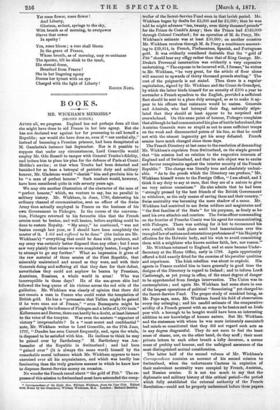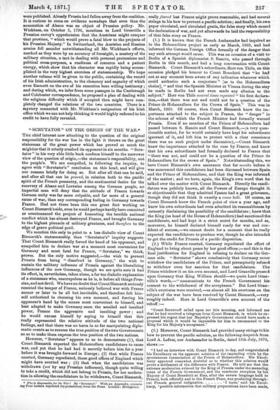BOOKS.
MR. WICKHAM'S MEMOIRS.* [SECOND NOTICE.] AFTER all, we progress. England has not perhaps done all that she might have done to aid France in her late agony. But she has not declared war against her for presuming to call herself a Republic ; nor would she have done so, even if "our cordial ally," instead of becoming a Prussian prisoner, had been decapitated at M. Gambetta's instance last September. Nor is it possible to suppose that under any circumstances, Lord Granville would employ Mr. Odo Russell to tamper with General Trochu's fidelity, and induce him to place his plan for the defence of Paris at Count Moltke's service ; or that when Trochu had been detected and banished for so base a betrayal of patriotic duty and military honour, Mr. Gladstone would " cherish " him and proclaim him to be "a man of perfect honour." Such conduct would, however, have been considered quite in rule seventy years ago.
We may cite another illustration of the character of the man of "perfect hononr," which, we venture to say, has no parallel in military history. Mr. Wickham, in June, 1796, distrusting his ordinary channel of communication, sent an officer of the Swiss Army then actually employed in France on the business of his own Government to Pichegru. In the course of the conversa- tion, Pichegru returned to his favourite idea that the French armies must be beaten, and well beaten, before anything could be done to restore Royalty. "My army," he continued, "was not beaten enough last year, or I should have been completely the master of it. I did and snifered to be done" (the italics are Mr. Wickham's) "everything that could be done with prudence, and my army was certainly better disposed than any other ; but I soon saw very plainly that unless we were completely beaten, I ought not to attempt to go any further." What an impression it gives of the raw material of those armies of the First Republic, that miserably maintained and armed as they were, and with their Generals doing and suffering all that they dare for their defeat, nevertheless they could not anyhow be beaten by Prussians,
Austrians, Russians, a whole world in arms ! Who was incorruptible in those days? He of the sea-green skin had followed the long queue of his victims across the red stile of the guillotine. Mr. Wickham was clearly of opinion that there did not remain a man in France who could resist the temptation of British gold. He has a "persuasion that Tallien might be gained if he were once out of France," "even Buonaparte might be gained through the influence of Pichegru and a bribe of 5,000 louis." Kellerman n and Barras, there can hardly be a doubt, at least listened to the voice of the tempter. Was even the austere "organizer of victory" irreproachable ? In a "moat secret and confidential" note, Mr. Wickham writes to Lord Grenville, on the 27th June, 1797, " Dandre has seen Carnot frequently, and, upon the whole, is disposed to be satisfied with him. He inclines to think he may be gained over by Barthelemy." M. Barthelemy was Am- bassador of the Republic in Switzerland ; and had been "gained over" (it is always the same word) himself by the remarkable moral influence which Mr. Wickham appears to have exercised over all his acquaintance, and which was hardly less fascinating than the truly gracious manner in which he knew how to dispense Secret-Service money on occasion.
No wonder the French raved about "the gold of Pitt." The ex- penses of this mission to Switzerland must have astounded the comp-
* Correspondence of the Right Hon. William Wickham, from the Year 1794. Edited with Notes by his Grandson, William Wickham, ILA. London : Richard Bentley.
troller of the Secret-Service Fund even in that lavish period. Mr. Wickham began by drafts for 15,000 and for £3,000; then he was told he might advance "ten, twenty, even thirty thousand pounds" for the Prince de Conde's Army ; then the Prince had 1140,000- through Colonel Craufurd ; for an operation of M. de Precy, Mr. Wickham's estimate was at least £50,000; on another occasion- Mr. Wickham receives through M. de Precy a remittance amount- ing to /29,814, in French, Piedmontese, Spanish, and Portuguese gold. It was evidently considered desirable that the "gold of Pitt" should bear any effigy rather than that of King George. Mr.. Drake's Provencal insurrection was evidently a very expensive- undertaking. "The expense to be incurred will, I foresee," he writes to Mr. Wickham, "be very great, for the article of flour alone will amount to upwards of thirty thousand pounds sterling." The cost of the poignards is not stated. Then there is a regular- capitulation, signed by Mr. Wickham and the Count de Grandpre, by which the latter binds himself for an annuity of /300 a year to. surrender a French squadron to the English, provided a sufficient fleet should be sent to a place duly arranged, so as to make it ap- pear to his officers that resistance would be useless. Generals. and Admirals, who had betrayed their flag, naturally stipu- lated that they should at least appear to be surprised and overwhelmed. On this same point of honour, Pichegru complains. that although he had communicated his plan of battle beforehand,the Austrian Generals were so stupid as not to mass sufficient troops on the weak and disconnected points of his line, so that he could not with the utmost ingenuity get his army defeated. French armies have much changed since those days.
The French Directory at last came to the resolution of demanding- Mr. Wickham's expulsion from Switzerland, on the simple ground that "his mission had no relation to the respective interests of' England and of Switzerland, and that its sole object was to excite. and favour conspiracies against the interior security of the French. Republic." The charge was literally true and absolutely undeni- able. "As to the proofs which the Directory can produce," Mr. Wickham himself wrote to the Foreign Office, "lam afraid, and I think it my duty to say at once, that they are of a nature to give me very serious uneasiness." He also admits that he had been "strongly pressed by the best friends of the British Government to withdraw, as the only means of saving them and their country."' Swiss neutrality was becoming the mere shadow of a name. Mr. Wickham had contrived to use Swiss soldiers and magistrates and' "the first families of the State" for his purposes, as freely as he used his own attaches and couriers. The Swiss officer commanding on the frontier of Franche Comte was his agent for communicating: with Pichegru. There was nothing for it but to recommend his. own recall, which took place amid loud lamentations over the. trampled law of nations and ostentatious professions of "his Majesty's- affection for the Helvetic body, and his wish to avoid committing them with a neighbour who knows neither faith, law, nor reason."' Mr. Wickham returned to England, and at once became Under- Secretary at the Home Office, early in 1798. Again opportunity offered a field exactly fitted for the exercise of his peculiar qualities. and experience. The Irish rebellion was about to explode. His agents in France enabled him to learn generally in good time the designs of the Directory in regard to Ireland ; and to inform Lord■ Castlereagh, as yet young in office, of the exact degree of danger- to be apprehended from foreign intervention. The Union was in. contemplation ; and again Mr. Wickham had some share in one of the largest operations of political " financiering" yet charged to. the Secret-Service Fund. The proper study of mankind being, as- Mr. Pope says, man, Mr. Wickham found his field of observation, every day enlarging ; and his candid estimate of the comparative- avidity of a French general with an army to be beaten and an Irish. peer with a borough to be bought would have been an interesting addition to our knowledge of human nature. But Mr. Wickham. and the statesmen with whom he was more intimately associatedi had minds so consiituted that they did not regard such acts as in any degree disgraceful. They do not seem to feel the least- sense of shame, nor, on the other hand, do they scoff ; their most private letters to each other breath a lofty decorum, a serene sense of probity and honour, and the unfeigned assurance of the most distinguished mutual consideration.
The latter half of the second volume of Mr. Wickham's Correspondence contains an account of his second mission to. Switzerland, when the unfortunate Cantons in expiation of their malevolent neutrality were occupied by French, Austrian, and Russian armies. It is not too much to say that the diplomatic and military history of this critical period—the period which fully established the external authority of the French- Revolution—could not be properly understood before these papers.
were published. Already Prussia had fallen away from the coalition. It is curious to come on evidence nowadays that even then the annexation of Alsace was an object of Prussian policy. Mr. Wickham, on October 5, 1796, mentions to Lord Grenville a Prussian envoy's apprehension that the Austrians might conquer that province, "which would prove a fatal blow to the projects of his Prussian Majesty." In Switzerland, the Austrian and Russian armies fell asunder notwithstanding all Mr. Wickham's efforts, marked as they were by an accuracy of foresight, a mastery of the military situation, a tact in dealing with personal pretensions and political cross-purposes, a readiness of resource and a patient energy, which show that his character was rapidly being accom- plished in the very highest exercises of statesmanship. We hope another volume will be given to the public, containing the record of his Irish administration, to the clemency and sagacity of which even Emmett on the eve of his execution bore willing testimony ; and during which, we infer from some passages in the Castlereagh and Colchester correspondence, he proposed a plan of dealing with the religious difficulty which if accepted then might have com- pletely changed the relations of the two countries. There is a mystery connected with Mr. Wickham's resignation of his Irish office which we can not help thinking it would highly redound to his credit to have fully revealed.



































 Previous page
Previous page